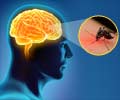A prototype vaccine against Japanese encephalitis, a viral disease endemic in Southeast Asia and parts of South Asia, is safe and triggers a good immune response against the pathogen, a study to be published on Saturday says.
Transmitted through mosquito bites, Japanese encephalitis can cause fever, blinding headaches, neck stiffness and convulsions and in a fifth of cases is fatal.The test vaccine, made by a Scottish subsidiary of Intercell AG, an Austrian-headquartered company, was tested on 867 adults in the United States, Britain and Austria.
Response from antibodies -- the frontline troops in the body's immune system -- was twice that for a existing vaccine against the disease and side effects "were generally mild," according to the study, which appears in The Lancet.
Around 50,000 cases of Japanese encephalitis occur each year, mainly in children under 10, according to the US Centers for Disease Control (CDC).
An outbreak in northern India this year claimed more than 300 lives. The natural reservoir for the virus is pigs and wild birds.
The disease has been mainly fought using a vaccine that is derived from the brains of mice that have been infected with the virus. The virus is then killed -- "inactivated" -- using chemicals before it is introduced into the body.
Advertisement
Some research has pointed the finger at pig gelatin stabilisers or residual mice proteins in the vaccine as the cause of these responses.
Advertisement
It is a promising candidate for travellers at risk and should be further studied for use among children in endemic countries, said Marc Fischer of the CDC and colleagues in a commentary also carried by The Lancet.
An alternative, Chinese-made vaccine, based on virus grown in hamster cells, is also increasingly being used against the disease.
Several Asian countries have licensed it, including Nepal and India, which used it to vaccinate 30 million children in 2006 and 2007. The Chinese formula needs fewer doses and is less expensive and easier to produce than the mouse-derived vaccine.
Source-AFP
KAR/P











